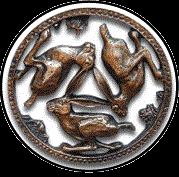


In order to understand this web site fully it is useful to have at least a working knowledge of fairy history and culture.The following statements can be regarded as useful reference points :
Fairy Tales:
1) What we call "fairy tales" are regarded by fairies as history. Let's take for example the story of say Red Riding Hood we regard this as fiction yet in fairy culture the child and her grandmother are historical figures.
Calendars:
2) Both our culture and fairy culture both share the same calendar and dating system although we have different festivals. Interestingly in the 19th Century both realms were ruled over by a queen called Victoria.
Technology:
3)Our culture has progressed along a technical path where fairy culture is much more reliant on magic. That is not to say fairies do not use technology they have for example electric lights and valve radios but more sophisticated electronics is replaced by magic (particularly telepathy spells).



Religion:
4) Fairy religion is much more akin to what we call "Pagan" having a respect and reverence for both the natural world and fertility. Stone Circles,The Pentangle, The Three Hares, The Lunar Cycle and The Harvest all play major roles in fairy religion.



Currency:
5) Fairy money, at least in Warkworth, never went decimal so Pounds, Shillings and Pence are still used as currency. Other old imperial units are also still widely adopted in most fairy realms.
.jpg)

Writing:
6) Both Fairy Script and Elven script are basically runic in style although many fairy scholars can also read our English text.

Music:
8) Fairy music is very rarely recorded; live performances being much more favoured among fairy folk. Many traditional folk songs are fairy in origin. What we regard as the traditional English Folk song "Reynardine" is one such song. Reynardine the fox is regarded as a shape shifter in fairy society.
Reynardine
1)One evening as I rambled among the springing thyme
I overheard a young woman converse with Reynardine
2)Her hair was black, her eyes were blue, her lips were ruby wine
And he smiled as he gazed upon her did sly, bold Reynardine
3)She said, "Kind sir, be civil my company forsake
For in my own opinion I fear you are some rake."
4)"Oh no ,I am no rake " he cried, brought up in Venus' train
For I'm searching for concealment all from from the judge's men.”
5)"And if by chance you look for me, by chance you'll not me find
For I'll be in my own castle enquire for Reynardine"
6) Sun and dark she followed him, his teeth did brightly shine
And he led her over the mountains did sly, bold Reynardine



Rune Stones:
7) These are huge (by fairy standards) monoliths that date back to the earliest days of written language. They still serve as meeting places for fairies and although not directly associated with religion seem to have a subliminal connection with fairy ancestors.

(Play Track)
Poetry:
9) Fairy culture holds in high esteem the human poets of Spenser, Tennyson and Shakespeare. Of the fairy poets however it is L. J. Toadflax (1843-1897) that has proved the most popular. His work is typified by patriotic verse of historic events.
The Coming Of The Gribblets
They came from Sproggit Mountain , Gribblets by the score,
Pouring over the hillside to the valley floor.
They were fluginising their chinkpots , with golden banners ran,
An army of beatrified Gribblets , a chimpod, a spillweed , a man.
Who would save the city ? Only a fitchwunk could tell,
Burning blue torches of water the approaching Gribblets yell,
"Turn loose Young Jaffnic The Elder or we'll take the city by storm."
And a voice from within the walls answered, in a manner both friendly and warm.
"If you want Young Jaffnic The Elder then you must learn to say please."
And a host of goznified Gribblets fell down, in the sand, on their knees.
When young eyes stare into the fire and Grandad drinks his ale
He recalls the death of the Gribblets but no one believes his tale,
No one that is save Jaffnic , who was the cause of it all,
But no spovsplatt from that city had shouted over that wall.
L. J. Toadflax


The Fairy In Winter
There was a Fairy - flake of winter -
Who, when the snow came, whispering, Silence,
Sister crystal to crystal sighing,
Making of meadow argent palace,
Night a star-sown solitude,
Cried 'neath her frozen eaves, "I burn here!"
Walter De La Mare
The Fairy Tea
'T was very, very long ago, in days no longer sung,
When giant stood about so high, and pixies all were young;
The Queen of Fairies said one day: "I 'm tired of honey-dew,
So hasten now, and mix for me a cup of something new."
"It must lift the drooping spirit; it must heal the wounded heart;
It must bring the smile of happiness, and bid the tear depart;
It must make the young grow younger; and the old no longer old;
It must make the poor contented, and the rich forget their gold."
Now, you can just imagine how the pixies, far and wide,
Came hurrying and scurrying with things to be supplied.
First, they bought a useful cauldron which some witches had for sale,
And the nixies brought sweet water front the Falls of Dryadvale.
Then they took some sprays of heartsease as the first thing to infuse,
And they added Johnny-jump-up as an antidote for blues.
For the young they brought the May-bloom, everlasting for the old;
For the rich and poor the joy-weed, which is just as good as gold.
When it boiled, they cooled and poured it, so the ancient story goes;
And to the Queen they brought it in the chalice of a rose.
She sipped, delighted; then she cried: "I issue this decree:
The cup you have so deftly brewed, I christen Fairy Tea!"
by D.K.S.



